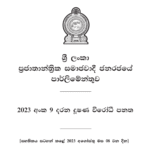Case Title: Ambudeniyage Dona Leelawathie (Deceased) vs. Karuna Aratchige Ranjith Ariyaratne
Court: Supreme Court of Sri Lanka
Case Number: SC Appeal No. 28/2013
Decision Date: 14 January 2016
Background
This case revolves around an action to revoke a deed of gift based on the grounds of gross ingratitude. The original plaintiff, Ambudeniyage Dona Leelawathie, gifted property to her son, the defendant, Karuna Aratchige Ranjith Ariyaratne. She later filed an action to revoke the gift, alleging ingratitude. The plaintiff passed away after testifying, and her husband sought substitution to continue the action.
The trial court ruled that the action abated upon the plaintiff’s death, as it was a personal action. This decision was upheld by the Civil Appellate High Court. The question before the Supreme Court was whether the plaintiff’s legal representative had the right to continue the action.
Key Legal Issues
- Whether an action to revoke a deed of gift for gross ingratitude qualifies as a personal action.
- If it is a personal action, does the action abate with the plaintiff’s death?
- Whether the plaintiff’s husband, as her heir, has the right to substitute and continue the action.
- Whether the concept of litis contestatio (stage of case development) impacts the survival of the cause of action.
Court’s Findings
- Nature of the Action:
The court held that the revocation of a deed of gift is a personal action because it involves the relationship between the donor and the donee, and it is rooted in personal grievances such as ingratitude. - Impact of Death:
The maxim “action personalis moritur cum persona” (a personal action dies with the person) applies to most personal actions. However, the court determined that this does not apply uniformly to all personal actions. The continuation of an action depends on whether the stage of litis contestatio has been reached. - Stage of Litis Contestatio:
- Litis contestatio was reached in this case, as pleadings were closed, and the plaintiff had provided evidence. This allows for the action to survive the death of the plaintiff.
- The court cited precedent cases where actions reached this stage, thus allowing legal representatives to continue the case.
- Right of Substitution:
- The plaintiff’s husband, as her heir, was found to have the right to be substituted and continue the action.
- The court interpreted Sections 392 and 395 of the Civil Procedure Code, which govern the continuation of actions after a party’s death.
- Historical and Comparative Jurisprudence:
- Roman-Dutch law, which governs the revocation of gifts in Sri Lanka, recognizes that personal actions may survive the death of a party if litis contestatio has been reached.
- The court also examined comparative perspectives from English and Roman-Dutch law regarding the survival of personal actions.
Decision
The Supreme Court overturned the decisions of both the District Court and the Civil Appellate High Court. It directed the District Court to:
- Substitute the plaintiff’s husband in place of the deceased.
- Continue the trial, adopting the evidence already led.
The appeal was allowed with costs awarded to the appellant.
Key Takeaways
- Personal actions can survive a plaintiff’s death if they reach the stage of litis contestatio.
- Substitution of legal representatives is permissible when the cause of action survives.
- Roman-Dutch law emphasizes the rights of heirs to pursue actions involving immovable property or gifts, even in personal disputes.
Implications
This case reaffirms the nuanced application of litis contestatio in Sri Lanka’s legal context, particularly in personal actions. It underscores the balance between procedural rules and substantive justice, allowing for heirs to pursue claims that are closely tied to property rights. The decision provides clarity on the survival of personal actions and the rights of legal representatives under the Civil Procedure Code.
Read Full Judgement














